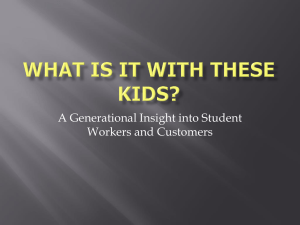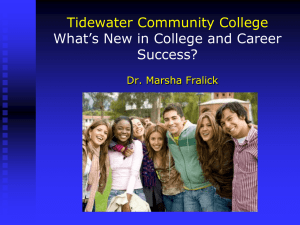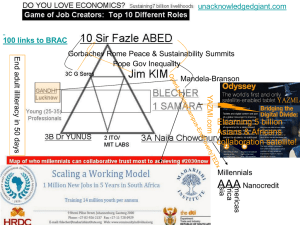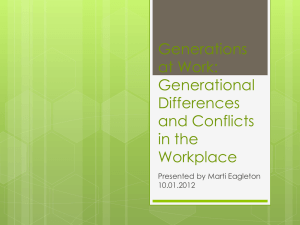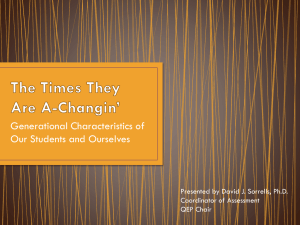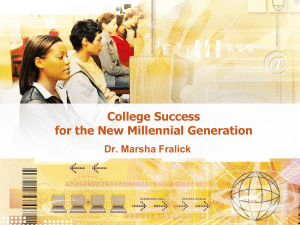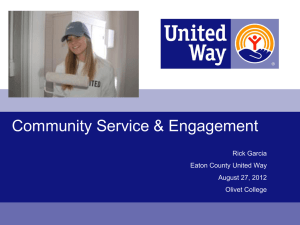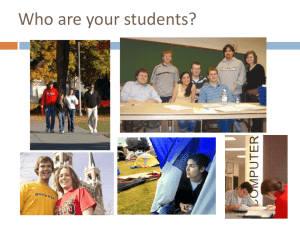Millennials and Pedagogy
advertisement
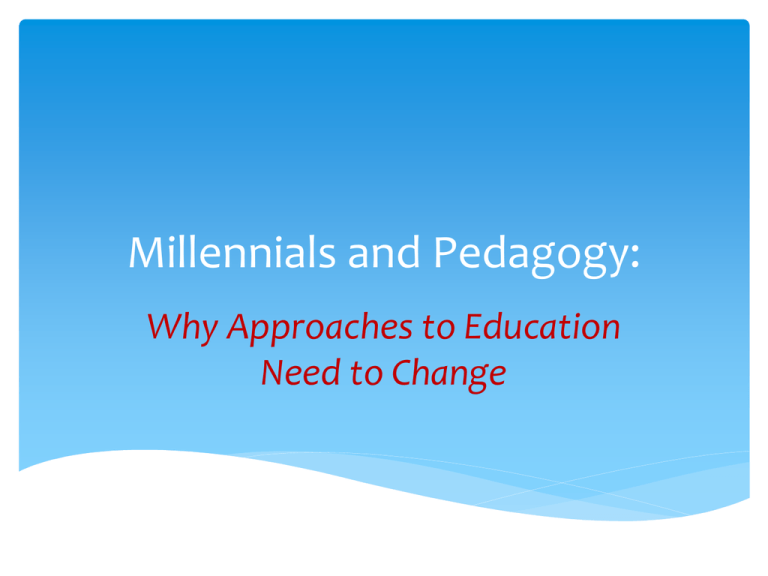
Millennials and Pedagogy: Why Approaches to Education Need to Change Teri McCarthy, PhD Associate professor at Lithuania Education University (formerly Vilnius Pedagogical University) www.leu.lt Teaching in Vilnius since 2011 PhD from the University of Kansas (USA) in Second Language Acquisition (applied linguistics) from the School of Education Has taught since 1983 at the tertiary level in China, Russia, Nigeria, Holland, and Afghanistan. Millennials Rising: The Next Great Generation The term Millennials was first used by Neil Howe and William Strauss (2000/2009). The authors define Millennials as those born from 1980 to 2000. These authors focused only on this generation in the USA (later global-wide research verifies startling similarities). The Millennial Generation Born in the early 1980s – onward. Increased use/familiarity with communications, media, digital technologies. In most parts of the world their upbringing is marked by an increase in a neoliberal** approach to politics/economics/worldview. Their overall beliefs about the world are impacted by their sense of a skewed egalitarianism and entitlement. **A political movement beginning in the 1960s that blends traditional liberal concerns for social justice with an emphasis on economic growth. Millennials Cont’d Classlessness and social equality are vitally important. Raised with a new democracy. Gender equality, racial equality, sexual-orientation equality, religious equality—all have to be honored. They believe that all boundaries and hierarchical distinctions are to be done away with. Millennials have no doubt that they are on equal footing with the entire human race. The Seven Core Traits of the USA Millennial Generation Trait #1 Special. From home-precious-baby movies of the mid-1980s to the media glare surrounding today’s young people, older generations have indoctrinated in Millennials the sense that Millennials are, collectively, vital to the nation, to the world, and to their parents’ sense of purpose. Trait #2 Sheltered. From the surge in child-safety laws ranging from mandatory car seats to bicycle helmets, as well as hotel-style security in today’s American university dorm rooms, Millennials have been the focus of the most sweeping youth-protection movement in American history. Trait #3 Confident. With high levels of collective optimism and a focus on positive solutions for big problems, this generation is striking an upbeat new tone about their own—and the world’s—future. Trait #4 Team oriented. From youth soccer and social networking to collaborative learning and community service, Millennials are developing strong team instincts, tight peer bonds, and a rising sense of civic engagement. Trait #5 Conventional. Taking pride in their improving behavior and comfortable with their parents’ values, Millennials provide a modern twist to the traditional belief that social rules and standards can make life easier—it’s okay to follow the rules. Trait #6 Pressured. Pushed to be #1 and to take full advantage of the opportunities offered them, Millennials feel a “trophy kid” pressure to excel, both in the classroom and in the workplace. Trait #7 Achieving. As accountability and higher school standards have risen to the top of America’s political agenda, Millennials have become a generation focused on achievement; they are the highest-educated young adults in U.S. history if measured by the number who attend university or institutions of higher education. The Pew Foundation’s 2010 Research: Confident Connected Self-expressive Upbeat Open to change Open-minded Pew Research found… They are less religious They are very upbeat and optimistic Connected to social media 1 in 5 has posted a self video on YouTube 4 in 10 have tattoos (but not where anyone can see them) 1 in 4 has a piercing other than their earlobes 6 in 10 were raised by both parents 50% of those polled say that at least one of their parents is their best friend Viacom’s Unprecedented Look At Millennials Worldwide 30,000 surveyed 15,000 interviewed Across 24 countries Published November 15, 2012 Viacom’s Findings: Over 3/4s of those polled describe themselves as very happy. Millennials’ levels of happiness outweigh stress levels by 2 to 1. Unemployment outweighs world hunger as the top global issue that young people want to see solved. Half believe that job security will only continue to get worse (49%). “Technology does not define me! It enables me!” 73% say that access to the Internet changes the way they view the world. “…change the world for the better!” Millennials are displaying a growing sense of national pride and interest in maintaining local traditions and at the same time they have an increasingly open and tolerant view of others and the world around them. 86% describe themselves as tolerant. 84% believe that “my age group has the potential to change the world for the better.” Tolerant 93% globally believe it is their responsibility to treat all people with respect regardless of race, gender, religion, political viewpoint or sexual orientation. Millennials “The attention of their parents, the political system…the educational system, and the marketplace has given Millennials a sense of importance and empowerment” (Howe & Strauss, 2009, p. 8). Viacom’s Research Demonstrates a World-Wide Trend Don’t think this isn’t happening in your “neck of the woods!” Talk to teachers in primary and secondary schools in your areas: kids are ruling the home, the classroom, and the marketplace. Parent/Teacher relationships are changing as parents see their child as exceptional. Principals, university rectors and university presidents are now seeing students as consumers. I wanted to see if my students in Lithuania were similar to Millennials around the globe…so I did my own survey. I conducted a web-based survey with 137 respondents: 44 – 18 to 22 year olds 56 – 23 to 25 year olds 18 – 26 to 30 year olds 17 – over 30 years of age Lithuanian Millennials 18-22 Year Olds Top Three: A good sense of humor – 82% Knew subject matter very well – 84% Warm and friendly – 75% Bottom Three: Very high expectations – 7% Very strict – 9% Lots of teaching experience – 32% In the words of Bob Dylan: The Times They Are A-Changin’ Come gather 'round people Wherever you roam And admit that the waters Around you have grown And accept it that soon You'll be drenched to the bone If your time to you Is worth savin' Then you better start swimmin' Or you'll sink like a stone For the times they are a-changin'. I know from my own experience, th that a teacher trained in the 20 century will need to adapt to her students who are learners in the 21st century. Irrigating Deserts Rethinking Didactics for University Instruction C.S. Lewis “The task of the modern educator is not to cut down jungles but to irrigate deserts” (The Abolition of Man, 1940/1996, p. 27). How do professors, trained in the 20th century, impact students? How do we “irrigate deserts” following C. S. Lewis’s admonition in The Abolition of Man? This paper details why it is imperative for professors to understand Millennial students’ unique ways of knowing and the heightened need for both instructional and personal changes. The role of the educator is to see the areas in the students’ learning experiences where nothing is growing, where there is no life, no knowledge and to teach in such a way as to affect change—just as water brings change to a desert. With proper nurturing and cultivating of ideas, relationships, and of learning, students can become “irrigated deserts” blooming with concepts, critical thinking skills, and knowledge. #1 Pedagogical Shift The professor/student relationship Research on today’s university students finds that the postmodern student who has been shaped by deconstructionism learns primarily, almost exclusively, through the professor/student relationship. The converse is also true. If the learner strongly dislikes a professor, feels invisible, or doesn’t feel valued by the professor, research shows that the student will not actively engage in the learning process. Research and Literature Review Carol Lundberg and Laurie Schreiner (2004) surveyed 4,500 students and found “Relationships with faculty were stronger predictors of learning than any other predictor including student background and characteristics—race, ethnicity, origin or color…” (p. 549). Jack Whitehead, lecturer in education at the University of Bath, sits on both the U.S and the British boards of the Educational Research Association. Whitehead writes, “…often overlooked, yet is emerging as a key element in the development of learning power, is the theme of relationships” (2002, p. 1). Whitehead continues, “It seems that the quality of relationships between learners and their teachers is central to the development of a climate where learners can change and grow and develop in their capacity to learn…Positive interpersonal relationships are those where both parties are able to offer the other respect, to listen carefully and to respond appropriately…” (p. 2). Shift Happens It appears that the shift from the student/faculty relationship impacting learning to the student/faculty relationship dictating learning is directly related to three major trends in modern culture and society: 1) A shift in the parent/child relationship, 2) Mass culture’s (and this isn’t only happening in the West) focus on students’ positive self-esteem, and 3) Society’s belief that equality means a level playing field for students and professors. The Why of It All “The attention of their parents, the political system…the educational system, and the marketplace has given Millennials a sense of importance and empowerment” (Howe & Strauss, 2009, p. 8). The Research Shows: Students want to connect with their professors. Students want equality. Students want mutuality. Students want respect in their relationships with professors. Research has indubitably shown that students today need strong and personal relationships with their professors in order to learn. Developing those relationships is hard and time-consuming. But it is possible. Learn students’ names. Give them a number where they can text you whatever they need to text you. Watch them do their thing. Value them as human beings. Speak to them outside the classroom. Hierarchy doesn’t work with this generation. #2 Pedagogical Shift Technology Students are tied to it; students live in it; students want it and we need to provide meaningful and useful ways to utilize technology for our students’ learning. How? Start a website for each of your classes. Give assignments for students to watch first-class lecturers on YouTube. Be on Facebook – as a person and as a professional; develop a FB page for your classes – make it a “virtual office”. Let ‘em keep their phones. Texting vs. tooling Let them create… Let your students go crazy with technology and create assignments. And teach them how to use technology for research, for planning, for writing and to enhance their studies. Stay current on the latest technology. PS - I should have used Prezi.com for this slideshow! #3 Pedagogical Shift Embrace multiple intelligences! Incorporate learning strategies that embrace the diversity of your students’ gifts and talents. Utilize cooperative learning – let them do group projects. Howard Gardner’s Multiple Intelligences #4 Pedagogical Shift Give them autonomy over their learning. #5 Pedagogical Shift…Parental Involvement Parents… In the USA we call these “helicopter” parents. Olavi Otepalu, a principal here in Tallinn at the Tallinn European School (TES) says, “The essence of the school is inclusive. Teachers, students and parents are deeply involved in school life” (Roonemaa, 2014, p. 78). TES has set up e-school, a unique online school system that can be easily monitored with a smartphone for parents to stay connected. #6 Pedagogical Shift…Student Approval Ratings As the student pool gets smaller and smaller universities must become more competitive for student enrollment. Student evaluations were given for the first time at my university in 2013! Departmental meetings consist of warnings: change or lose your job to another. Universities are now seeing students as consumers. Ken Bain, director of New York University’s Center for Teaching Excellence “Great teachers are not just great speakers or discussion leaders; they are, more fundamentally, special kinds of scholars and thinkers, leading intellectual lives that focus on learning—both theirs and their students'” (B7). Perhaps we as professors dealing with Millennials (21st Century Students) can help them understand what is truly good, what is truly true, and what is truly beautiful by building relationships that enable us to mentor them, model for them and conceivably mold some of them to see the world around them in a new light and perhaps in a new way. After all, isn’t that the real definition of learning? Lendol Calder writes, “…good teachers do not cling to their prerogatives as professors, but humble themselves to see as students see, to learn what students are learning... Under the current climate of assumptions, professors are loath to do this. Such reluctance is why, for learning to happen, scholarly teachers will have to be born. For good teachers to be born, it may be that professors will have to die to their rights and traditions” (2004, p. 12). teri@iics.com Is there more time? Then let’s look @ those respondents who are over 30 years old… Characteristics of a Good Teacher 64% said a good sense of humor was important. 35% felt knowing the students’ names was important. 82% said “interesting” was a significant trait for a good teacher. 70% warm and friendly was important. 0% said high expectations mattered. 65% teachers need to be good communicators. 17 and Under 100% on Facebook 100% interact with technology twice an hour 100% teachers must have a good sense of humor 100% teachers that are good know students’ names 100% good teachers are prepare interesting lessons 100% believed the most important values for them personally were tolerance and honesty.
